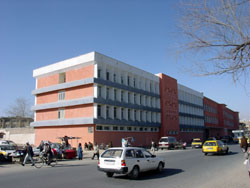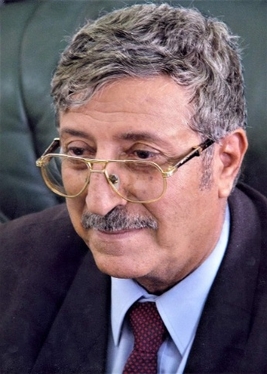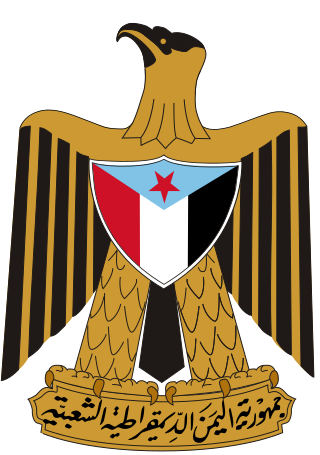
Abdul Karim Ali Al-Iryani was a Yemeni politician who served as the Prime Minister of Yemen from 29 April 1998 to 31 March 2001. Al-Iryani, along with President Ali Abdullah Saleh, was the Secretary General of the General People's Congress (GPC).

Abdul Fattah Ismail Ali Al-Jawfi was a Yemeni Marxist politician and revolutionary who was the de facto leader of South Yemen from 1978 to 1980 after the overthrow of President Salim Rubaya Ali. He served as Chairman of the Presidium of the Supreme People's Council and founder, chief ideologue and first leader of the Yemeni Socialist Party from 21 December 1978 to 21 April 1980. He died under mysterious circumstances during the 1986 South Yemen Civil War and his body was never found.
Abd al-Aziz, frequently also transliterated Abdul-Aziz, is a male Arabic Muslim given name and, in modern usage, surname. It is built from the words ʽAbd, the Arabic definite article and ʽAzīz "Almighty". The name is commonly abbreviated as "ʽAzīz". The name means "servant of the Almighty", al-ʽAzīz being one of the names of God in Islam, which give rise to the Muslim theophoric names.
Abd al-Salam is a male Muslim honorific or given name, built on the Arabic words Abd, al- and Salam. The name means "servant of the All-peaceable", as-Salam being one of the names of God in the Qur'an, which give rise to the Muslim theophoric names.

The Most Esteemed Order of the Defender of the Realm is a Malaysian federal award presented for meritorious service to the country. The Order Motto are 'Dipeliharakan Allah-Pangkuan Negara'.
Abdelrahman or Abd al-Rahman or Abdul Rahman or Abdurrahman or Abdrrahman is a male Arabic Muslim given name, and in modern usage, surname. It is built from the Arabic words Abd, al- and Rahman. The name means "servant of the most gracious", ar-Rahman being one of the names of God in the Qur'an, which give rise to the Muslim theophoric names.
The Most Esteemed Order of Loyalty to the Crown of Malaysia is a Malaysian federal award presented for meritorious service to the country and awarded by the sovereign.

The Ministry of Finance of Afghanistan is responsible for the implementation and execution of the budget, collection of taxes, organization, and control of public expenses in Afghanistan; it also controls the management of the Custom Affairs. The Ministry of Finance provides a quarterly report to inform the public and the executive cabinet of advancements in Afghanistan's financial sector. The current Finance Minister is Nasir Akhund.

The Imams of Yemen, later also titled the Kings of Yemen, were religiously consecrated leaders (imams) belonging to the Zaidi branch of Shia Islam. They established a blend of religious and temporal-political rule in parts of Yemen from 897. Their imamate endured under varying circumstances until the end of the North Yemen civil war in 1970, following the republican revolution in 1962. Zaidi theology differs from Isma'ilism and Twelver Shi'ism by stressing the presence of an active and visible imam as leader. The imam was expected to be knowledgeable in religious scholarship, and to prove himself a worthy headman of the community, even in battle if this was necessary. A claimant of the imamate would proclaim a "call" (dawah), and there were not infrequently more than one claimant.

Abdul Aziz Al-Maqaleh was a Yemeni poet and writer. Primarily writing in free verse, Al-Maqaleh has been described as Yemen's "best-known and most-laureled twentieth-century poet."

The South Yemen civil war, colloquially referred to in Yemen as the events of '86, the events of January 13, or simply as the events, was a failed coup d'etat and brief civil war which took place on January 13, 1986, in South Yemen. The civil war developed as a result of ideological differences, and later tribal tensions, between two factions of the ruling Yemeni Socialist Party (YSP), centred on Abdul Fattah Ismail's faction, at-Toghmah, and Ali Nasir Muhammad's faction, az-Zomrah, for the leadership of the YSP and South Yemen. The conflict quickly escalated into a costly civil war that lasted eleven days and resulted in thousands of casualties. Additionally, the conflict resulted in the demise of much of the Yemeni Socialist Party's most experienced socialist leadership cadre, contributing to a much weaker government and the country's eventual unification with North Yemen in 1990.
Chowdhury also: Choudhuri, Chaudhuri, Choudhury, Chaudhri is a title of honour, usually hereditary, originating from the Indian subcontinent. It is an adaption from Sanskrit. During the Mughal rule, it was a title awarded to eminent people, while during British rule, the term was associated with zamindars and social leaders. The common female equivalent was Chowdhurani.

The Ministry of Justice is a cabinet ministry of Yemen.
Deputy Prime Minister of Afghanistan is a senior political office in the Cabinet of Afghanistan. Throughout history, several persons have hold the office concurrently.

The Minister of Finance was a government minister in charge of the Ministry of Finance of South Yemen, in what is now southern Yemen. The Minister was responsible for public finances of the country.









